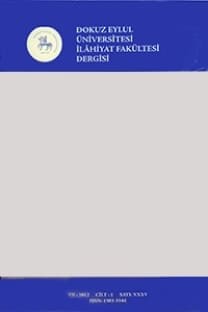MEZHEP TAASSUBUNUN ÖNE ÇIKTIĞI BİR RİVAYET/DİRAYET TEFSİRİ -Kummî Tefsiri
Kur‟ân‟ın yorumlanmasında ön kabullerden uzak bir şekilde hareket etmek yerine mezhep taassubuna binaen ve önceden kabul edilmiş teorilerin metin üzerinden gerekçelendirilmesi cihetine gitmek birçok önemli probleme neden olmaktadır. Bir kısım müfessirler eserlerini telif ederken mensup oldukları hâkim paradigmanın gölgesinde hareket etmiş, kendi mezheplerini güçlendirmek veya karşı oldukları mezheplerin ortaya koydukları delilleri çürütmek amacını gütmüşlerdir. Bu bağlamda bazı İiîmüfessirler de kendi görüşlerini desteklemek ve kabul ettirmek için bütün müslümanlar nezdinde otorite metin kabul edilen Kur‟ân-ı Kerim‟den kendi görüşlerini destekleyecek deliller bulmaya çalışmış, bulamadıkları zaman ise ayetleri kendi mezhep prensipleri çerçevesinde tevil etmeye yönelmişlerdir. Bu süreçte ayetler müstakil olarak ele alınmış, nüzûl ortamı, yani Kur‟an‟ın inzal edildiği günün şartları ve Kur‟an‟ın bütünlüğü göz ardı edilmiştir. Bu makalede Kummî tefsirinde mezhep refleksi ile Kur‟ân‟ın araçsallaştırılmasının örneklerini ortaya koymaya çalışacağız.
A RIVAYAH/DIRAYAH TAFSEER PRESENTED BY THE SECTARIAN BIGOTRY - Tafseer of Kummi -
Interpretation of Quran based on sectarian bigotry and justification of previouslyaccepted theories on the text rather than acting away from preconceptions causes several important problems. Many commentators while studying their works they have acted according to the dominant paradigm which they belong to, they aimed to strengthen their sects or refute the proofs provided by other sects that they are against. In this context, Shiite commentators also tried to find out evidences to support and sell on their opinions from the Quran that is accepted an authoritarian text according to all Muslims and when they couldn‟t find the evidence they had tended to comment the ayats in the frame of their sectarian principles. During this procedure, ayats were examined separately, bringdown environment, conditions of the days of Quranic bringdown and completeness of Quran were ignored. In this study we will try to examine the examples of functionalization of Quran according to sectarian reflex, in the Tafseer of Kummi.
___
Bahşayeşî, Akiki, Tabakat-ı Müfessiran-ı Şîa, Kum, Defter-i Neşr-i Novid-i İslami, 1371Elik, Hasan Coşkun Muhammed, Tevhit Mesajı, İstanbul, 2013.
Emin, İhsan, et-Tefsir bi‟l-Me‟sur ve Tatavvuruhu inde‟ş-İiati‟l-İmamiyye, Beyrut, 2000.
Habibov, Aslan, İlk Dönem İiî Tefsir Anlayışı, (Yayınlanmamış Doktora Tezi) Ankara 2007.
İbn en-Nedim, Ebu'l-Ferec Muhammed b. İshâk, el-Fihrist, Beyrut, 1978.
Kâşânî, Molla Muhsin Muhammed b. Murtaza b. Mahmûd Feyz-i Kâşânî, Tefsiru‟s-Sâfî, tsh. Hüseyin A'lemî, Beyrut, 1982.
Kummî, Ebü‟l-Hasan Ali b. İbrâhim, Tefsirü‟l-Kummî, thk. Tayyib el-Musevi elCezairi. y.y,t.y.
Marifet, Muhammed Hadi, et-Tefsir ve‟l-Müfessirun fi sevbihi‟l-kaşîb, Meşhed, 1997.
Necâşi, Ebu‟l-Abbâs Ahmed b. Ali b. Ahmed, Ricalü'n-Necâşî: Ehadu'l-Usûli'rRicâliyye, thk. Muhammed Cevad Naini, Beyrut, 1988.
Öztürk, Mustafa, Tefsirde Ehl-i Sünnet-İîa Polemikleri, Ankara, 2009.
Tabatabâî, Muhammed Hüseyin, el-Mîzân fî Tefsîri‟l-Kur‟ân, Beyrut, 1973.
Tabersî, Ebû Ali Eminüddin Fazl b. Hasan b. Fazl, Mecmeu‟l-Beyân fî Tefsiri‟lKur‟ân, Beyrut, 2008.
Tûsî, Ebû Cafer Muhammed b. Hasen b. Alî, el-Fihrist, thk Cevad Kayyumî. y.y., Müessesetu Neşri‟l-Fukaha, 1417.
--------, et-Tibyân fi Tefsîri‟l-Kur‟ân, Beyrut, (t.y.)
- ISSN: 1303-3344
- Yayın Aralığı: Yılda 2 Sayı
- Başlangıç: 1983
- Yayıncı: Dokuz Eylül Üniversitesi İlahiyat Fakültesi
Sayıdaki Diğer Makaleler
Mezhep Taassubunun Öne Çıktığı Bir Rivayet/Dirayet Tefsiri -Kummî Tefsiri-
EBÛ HAYYÂN‟IN EL-BAHRU‟L-MUHÎT İSİMLİ TEFSİRİ BAĞLAMINDA NAHVE DAİR METODİK ESASLARI
FIKIH USULÜNÜN TEMELLERİ: HZ. PEYGAMBER DEVRİNDE DELİLLER
MEZHEP TAASSUBUNUN ÖNE ÇIKTIĞI BİR RİVAYET/DİRAYET TEFSİRİ -Kummî Tefsiri
BAYRÂMÎ-MELÂMÎ BİR ŞÂİR: HÂŞİMÎ EMÎR OSMAN EFENDİ
TEFSÎRDE KİTAB-I MUKADDESİN TAHRÎFİ MESELESİ: II (Tahrîf Kelimesinin Müradifleri Bağlamında)
ÜÇÜNCÜ YÜZYIL HIRİSTİYANLIĞINDA DİNDEN DÖNME HADİSELERİ VE NOVATİANİZM
